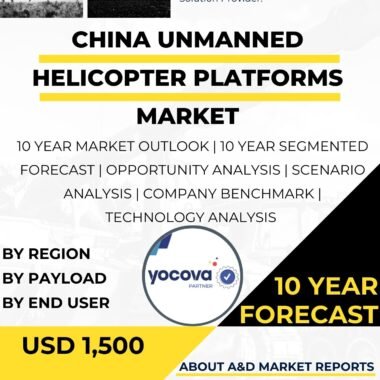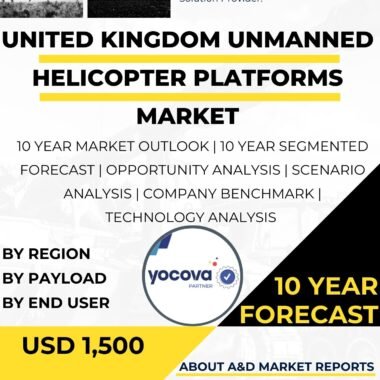Description
Brazil’s ATD-150 UHR Program and Its Impact on Unmanned Helicopter Development
Brazil unmanned helicopter platforms market is significantly advanced by the ATD-150 Unmanned Helicopter Rotorcraft (UHR) program, a pioneering effort to develop an indigenous, jet-powered unmanned aerial vehicle tailored for multirole missions. Led by Nest Design Aerospace in collaboration with Turbomachine, this initiative enhances Brazil’s aerial capabilities while fostering technological self-reliance and industrial growth.
ATD-150 UHR: Indigenous Jet-Powered Innovation
The ATD-150 UHR, Brazil’s first jet-powered unmanned helicopter, is powered by Turbomachine’s TM TJ-200 turbojet engine, delivering 3,200 N of thrust for a cruise speed of Mach 0.6 and operations up to 20,000 feet. Designed for reconnaissance, surveillance, and target simulation, the ATD-150 supports Brazilian Armed Forces’ missions with a compact design (63 cm long, 33 cm diameter engine). Initiated for aerial target roles, its modular platform allows adaptations for cargo transport and ISR (Intelligence, Surveillance, Reconnaissance), with testing underway at São José dos Campos by 2025.
Technology Transfer and Local Industry Growth
The program emphasizes local production, with Turbomachine’s Jacareí facility integrating 70% indigenous content. Partnerships with Embraer and CTEx facilitate technology transfers, enabling advancements in avionics, EO/IR sensors, and autonomous navigation systems. This builds on Brazil’s aerospace expertise, creating high-skilled jobs and positioning the ATD-150 for potential exports to Latin American markets like Chile and Peru, aligning with a projected 6.5% CAGR for the regional UAV market through 2031.
Applications in Diverse Missions
The ATD-150’s versatility supports defense and civilian applications, including maritime surveillance along Brazil’s 7,491-km coastline, environmental monitoring in the Amazon, and disaster response. Its thermal imaging and data-link capabilities enable real-time intelligence for border security under SISFRON and wildfire assessments, reducing risks to human pilots in hazardous conditions. The platform’s payload flexibility also supports precision agriculture, enhancing Brazil’s agribusiness efficiency.
Strategic and Regional Implications
By developing the ATD-150, Brazil strengthens its role in regional security, participating in multinational exercises like IBSAMAR to test unmanned interoperability. The program’s focus on autonomy and jet propulsion sets a benchmark for South American UAV development, fostering collaborations with global firms like Elbit Systems for sensor integration. This enhances Brazil’s defense export potential, contributing to economic growth and regional stability.
In summary, the ATD-150 UHR program drives Brazil’s unmanned helicopter market by delivering a versatile, locally developed platform that enhances aerial reconnaissance, environmental monitoring, and disaster response. By prioritizing self-reliance and innovation, Brazil solidifies its position as a leader in Latin American aerospace technology.




